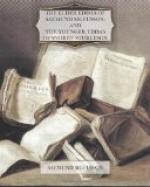The Lay of Volund (Volundarkvida) celebrates the story of Volund’s doings and sufferings during his sojourn in the territory of the Swedish king Nidud. Volund (Ger. Wieland, Fr. Veland and Galans) is the Scandinavian and Germanic Vulcan (Hephaistos) and Daedalus. In England his story, as a skillful smith, is traceable to a very early period. In the Anglo-Saxon poem of Beowulf we find that hero desiring, in the event of his falling in conflict with Grendel, that his corslets may be sent to Hygelac, being, as he says, the work of Weland; and king AElfred, in his translation of Boethius de Consolatione, renders the words fidelis ossa Fabricii, etc. by Hwaet (hwaer) Welondes? (Where are now the bones of the famous and wise goldsmith Weland?), evidently taking the proper name of Fabricius for an appellative equivalent to faber. In the Exeter Book, too, there is a poem in substance closely resembling the Eddaic lay. In his novel of Kenilworth, Walter Scott has been guilty of a woeful perversion of the old tradition, travestied from the Berkshire legend of Wayland Smith. As a land-boundary we find Weland’s smithy in a Charter of king Eadred A.D. 955.
On the Lay of Helgi Hiorvard’s Son there is nothing to remark beyond what appears in the poem itself.
The Lays of Helgi Hundingcide form the first of the series of stories relating to the Volsung race, and the Giukungs, or Niflungs.
The connection of the several personages celebrated in these poems will appear plain from the following tables:
Sigi, king of Hunaland, said to be a son of Odin | Rerir | Volsung = a daughter of the giant Hrimnir __________________| | Sigmund = Signi = Borghild = Hiordis | | | | Hamund. Sinfiotli. Helgi = Sigrun Sigurd = Gudrun __|____________ | | Sigmund, Svanhild. m Jornmnrek.
Giuki = Grimhild. _______________________| | Gunnar=Glaumvor. Hogni=Kostbera. Guthorm. Gudrun,=1 Sigurd. | 2 Atli. Solar. Giuki. Snaevar. 3 Jonakr.
Budli. | Atli = Gudrun: Brynhild = Gunnar. Oddrun. Beckhild = Heimir. | | Erp. Eitil Alsvid.
Jonakr = Gudrun _____| |__________ | | Erp Hamdir. Sorli.
The Eddaic series of the Volsung and Niflung lays terminates with the Lay of Hamdir; the one entitled Gunnar’s Melody is no doubt a comparatively late composition; yet being written in the true ancient spirit of the North is well deserving of a place among the Eddaic poems. Nor, indeed, is the claim of the Lay of Grotti to rank among the poems collected by Saemund, by any means clear, we know it only from its existence in the Skalda; yet on account of its antiquity, its intrinsic worth, and its reception in other editions of the Edda, both in original and translation, the present work would seem, and justly so, incomplete without it.




